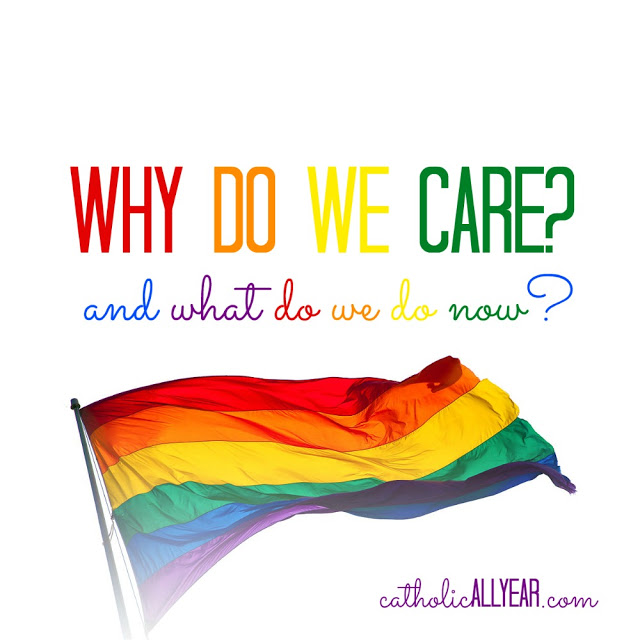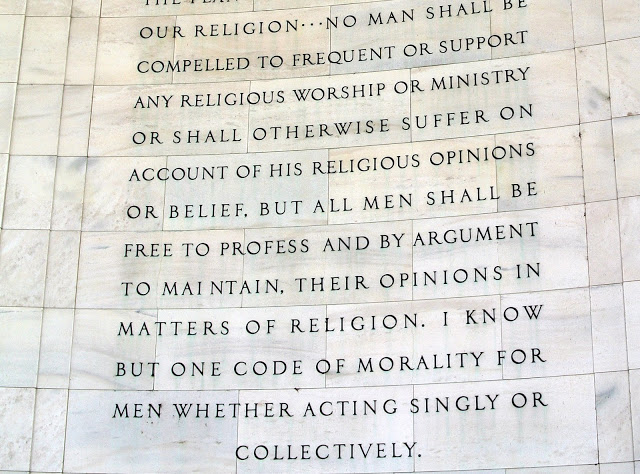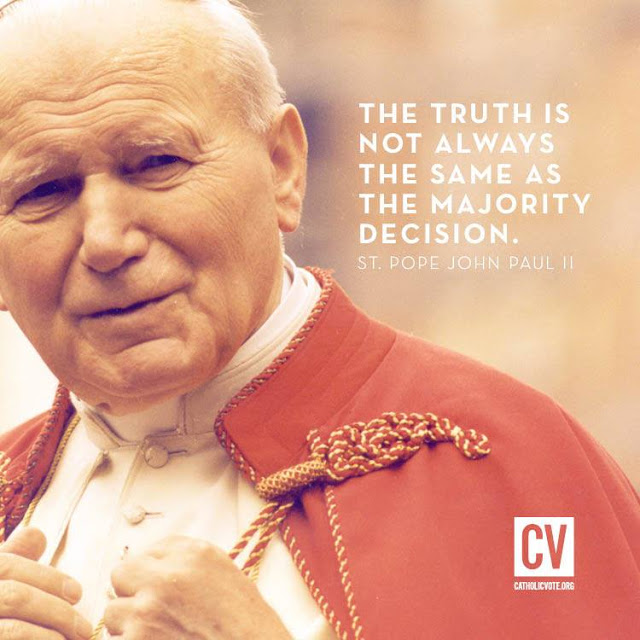In the wake of Friday’s Supreme Court ruling that made gay
marriage legal across the United States, I figured I’d share a few thoughts and a mailbag question.
Especially in light of all the social media frenzy over the SCOTUS decision, all the unfriending and name calling, I think those are the two questions we want to ask ourselves as Catholics. Why do we care? and What do we do now?
Let’s look at the second one first. Here’s what WE can do going forward . . .
1. We Can Live Our Own Marriages
It’s been a LONG time since what the world calls marriage and what the Catholic Church calls marriage have been the same thing. Contraception, abortion, no-fault divorce, the normalization of cohabitation and the having of children outside of wedlock, pornography and the sexual revolution, are all as great or even greater threats to marriage than is this redefinition of civil marriage.
We are missionaries in a pagan culture.
I think the most powerful thing we as Christians can do is to live committed, loving, monogamous, open to life marriages. We can raise strong and loving and well-formed children. We can hope that people will see the joy in our lives, and ask us about it.
2. We Can Love the People Around Us
I think there were good reasons to fight for the preservation of a traditional definition of marriage. But I don’t think this supreme court decision was a surprise to any of us.
What I think WOULD surprise people is what the Catholic Church actually teaches about same sex attraction. There is no hate there.
2358 The number of men and women who have
deep-seated homosexual tendencies is not negligible. This inclination,
which is objectively disordered, constitutes for most of them a trial.
They must be accepted with respect, compassion, and sensitivity. Every
sign of unjust discrimination in their regard should be avoided. These
persons are called to fulfill God’s will in their lives and, if they are
Christians, to unite to the sacrifice of the Lord’s Cross the
difficulties they may encounter from their condition.
We can and we must treat the people around us with love and respect. Even if they hold beliefs at odds with our own. Even if they are behaving in ways we know aren’t good for them. Even if they are being frustrating on Facebook.
3. We Can Fight for Freedom of Conscience
‘Cause THAT’S the thing that actually scares me in all of this. I worry that I, or my children, will live in a country without freedom of thought, conscience, and religion.
To address the first question, I want to share this mailbag question. I received it a few weeks ago from a college student, and seems particularly of interest now.
Question:
In one of your latest posts, with the list of how to be a good Catholic, you say that one must vote in accordance with the Catholic doctrine to be a good Catholic. I am just wondering why that need be the case. I feel that as an adult, I can believe that certain things are wrong, and I can choose not to practice them, and I can discourage those I love from practicing them, but I can also allow those things to be legal for other adults that choose to engage in them. The best example of this for me is gay marriage (because I think something like abortion exists separately) but I have a hard time understanding why I am supposed to vote to make gay marriage illegal between two consenting adults. I understand thinking it is wrong and discouraging people from pursuing it, but why am I supposed to vote against it? People do a lot of things that I morally disagree with that I don’t think needs to be illegal. I am sorry if that seems like a silly question, but I really would appreciate clarification.
Answer:
Honestly, I totally get where you are coming from on the gay marriage issue. I really, really do. My natural inclinations definitely skew libertarian, I kind of want people to let me do whatever I want to do and I’ll let them do whatever they want to do and we’ll all just leave each other alone. But . . . it turns out that’s not a very Christian attitude to have.
One of the things I mention in the Exactly How to Be a Good Catholic post are the “works of mercy.” They are Bibically based (from the beatitudes, the two Great Commandments, and Matthew 25:34-46) and have been a constant tradition since the earliest days of the Church.
The corporal works of mercy are:
- To feed the hungry;
- To give drink to the thirsty;
- To clothe the naked;
- To shelter the homeless;
- To visit the sick;
- To ransom the captive;
- To bury the dead.
The spiritual works of mercy are:
- To instruct the ignorant;
- To counsel the doubtful;
- To admonish sinners;
- To bear wrongs patiently;
- To forgive offenses willingly;
- To comfort the afflicted;
- To pray for the living and the dead.
So even if my personal preference is to not bother or be bothered by other people, I have the responsibility, as a Christian, to try to look after their physical and spiritual well-being as much as I am able. When I have to make an account for my life at the final judgement, I’m going to want to be able to say that I fed the hungry and clothed the naked and visited the sick AND I instructed the ignorant and counseled the doubtful and admonished sinners. That I didn’t just turn a blind eye to sinful behaviors because I didn’t want to hurt anyone’s feelings, or look uncool. That means I personally must help actual people I know, and support good charities, and vote for politicians and policies most likely to benefit the physical AND the spiritual well being of my fellow man.
In theory, it’s easy.
In practice, of course, it’s much more complicated. Because voting for one person means you’re not voting for another, and sometimes the same person supports some morally good policies, and some morally bad policies.
Also, certain behaviors, like homosexual activity, get singled out by prominent Christians as the only important issue, when things like pornography and adultery and heterosexual cohabitation are just as much against Catholic teaching and bad for people’s souls. An ideal Christian society should have laws that uphold the sanctity of marriage against ALL of the threats against it. But those laws need to go hand in hand with good formation and cultural support, so that people understand WHY marriage is important and what it entails. It’s easy to wonder, with what marriage has actually come to mean in our society, whether it’s worth bothering with trying to defend it at all. (I think the answer is, it’s still worth a try.)
Basically, what I think it comes down to is an informed conscience. Catholics use “conscience” to justify engaging in all sorts of behaviors condemned by the Catholic Church. It doesn’t “feel” wrong to them because they’ve never bothered to learn and understand the Church’s position on an issue like fornication or contraception. And if it doesn’t feel wrong to them, they think they can do it. But the key is to have an informed conscience. To really take the time to learn and know and understand Church teaching, and to research candidates and propositions and vote in the way that you believe will help the most souls to get to heaven.
That’s the best you can do for yourself and for your fellow man.
Cheers,
Kendra
If you read anything on this blog that is contrary to Church teaching,
please consider it my error (and let me know!). I’m not a doctor or an
expert on anything in particular. I’m just one person with a lot of
experience parenting little kids and a desire to share my joy in
marriage, mothering, and my faith.
you’ve got a question, please send it along to catholicallyear @ gmail .
com . Please let me know if you prefer that I change your name if I use
your question on the blog.
Let’s get out there and be pleasant and truthful on Facebook, people. Both.
p.s. Happy Feast of Sts. Peter and Paul. It’s a solemnity, so don’t forget dessert!









